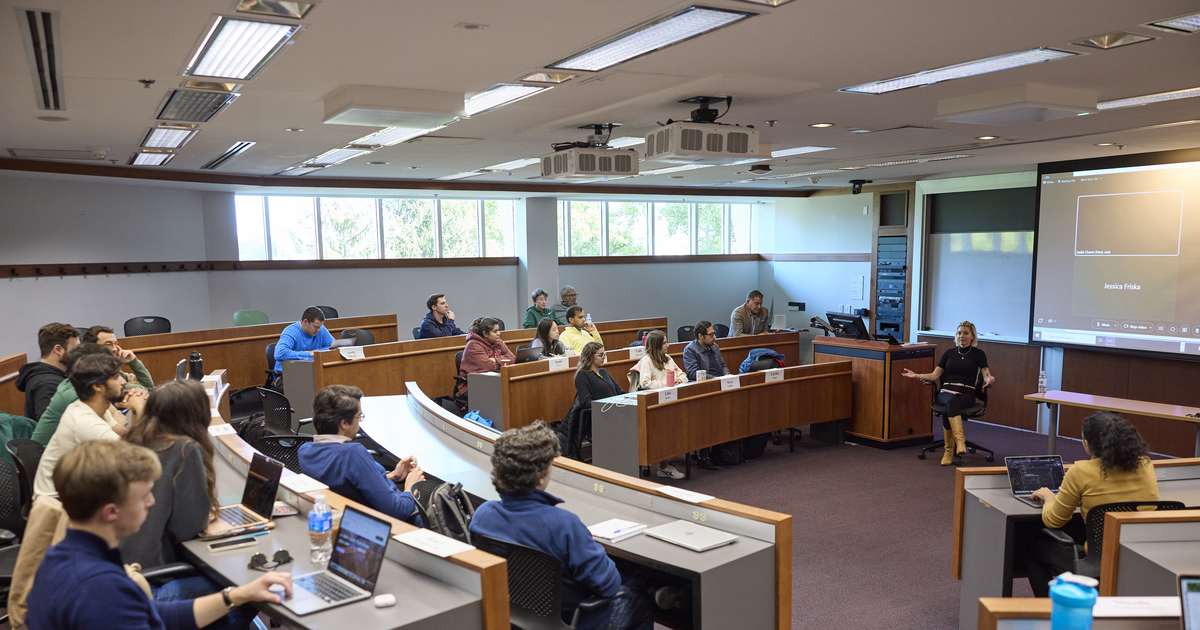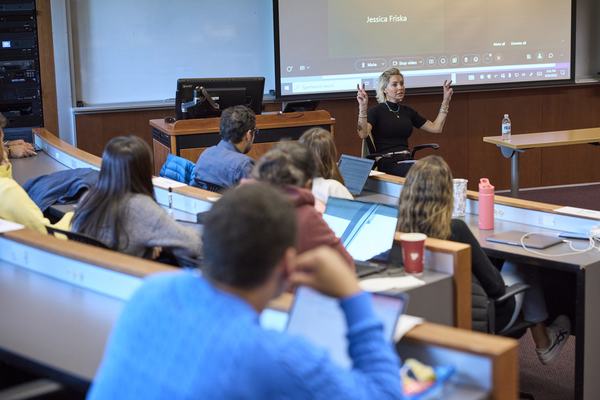Professors of Practice: Connecting Theory and Practice

Ask Brad Johnson, an assistant professor of practice at Babson College and former vice president at Wayfair Inc., how his vast and varied career impacts his students, and he has plenty of examples.
There’s Johnson’s friend who started a company called Where’s the Bus? The startup alerts parents about where their child is along their bus route home. The company’s CEO—at Johnson’s recommendation—brought on two Babson second-year students as summer interns.
“They did a fantastic job and really helped the company,” Johnson said, adding that the students got glowing reviews from the company’s leadership. “They were like, ‘What can we do to hire them full time?’ ”
Or, how about the current executive working in the supply chain division at TJX? He used to be Johnson’s employee, and the company recently created a supply chain internship program. The executive asked Johnson to help find the perfect students to fill the internships.
“Those students will get some incredible exposure at TJX,” Johnson said.
“I think what comes across to students when they’re taught by a professor of practice is that we are able to leverage our backgrounds and experiences to make their classes that much better.”
Babson recently updated job titles for full-time, non-tenure track faculty. The College replaced titles such as “lecturer” and “senior lecturer,” with “professor of practice” and “professor of teaching,” to better highlight the faculty’s focus, skills, and experiences in the real world.
Connections in the Classroom
For students, a class led by a professor of practice often means direct access to several key executive leaders. Those leaders share details of challenges they have faced, initiatives they have created and led. Meanwhile, students can potentially interview them for an academic paper or contact them for a future job.

“From an industry perspective, there are a lot of good contacts and relationships that I’ve been able to leverage in multiple ways,” Johnson said.
“From inviting speakers into the classroom to working with Babson’s Centers for Career Development to help our students gain internships or full-time employment.”
Babson Professor of Practice Caroline Daniels, who led the charge to change non-tenure track professors’ titles, said the real-world experience she and other professors of practice bring to the classroom helps students in a number of ways.
“We are working with companies as we teach, working with new ideas, experimenting, bringing in new exercises and creating new cases,” Daniels said. “I think it’s a continuation of what Babson is best known for. We’re entrepreneurial in every aspect. To stay on the cutting edge of education, we stay in touch with leading innovations in many industries and participate in many of those.”
Real-World Experience
In a rapidly changing business landscape where adaptability and innovation are paramount, professors of practice ensure that their lessons keep pace with the demands of industry.
“I think the students find all the theory and other frameworks much more understandable and relatable when you can provide real-life examples,” Johnson said. “I think that probably keeps the engagement level very high in my classes.”
Other key benefits that professors of practice bring to Babson classrooms include:
- Practical Insights: Professors of practice are well-versed in the latest trends, challenges, and opportunities within their respective industries. They can relate theory to real-world situations, helping students understand the practical implications of what they are learning.
- Networking Opportunities: Many professors of practice maintain active networks within their industries. This gives students the chance to connect with professionals and potential employers, facilitating internships, job placements, and valuable industry contacts.
“It’s a continuation of what Babson is best known for. We’re entrepreneurial in every aspect. To stay on the cutting edge of education, we stay in touch with leading innovations in many industries and participate in many of those.”Caroline Daniels, Professor of Practice
- Research, Writing, Curriculum Development, and Events: Professors of practice constantly research and participate in the latest developments of company and organizational challenges, write research articles cases, create events, and develop curriculum including in-class exercises.
- Mentorship: These professors often serve as mentors to students, guiding them in career planning and offering personalized advice based on their own experiences. This mentorship goes beyond the classroom, helping students make informed decisions about their future.
In addition to guidance from professors of practice, students often benefit from alumni, Johnson said. Those visits can impact students more than a C-suite executive.
“I think of it as coming full circle. I keep in touch with a lot of my former students, they reach out to me, and they come back to my classes to present,” Johnson said. “A student who has graduated a year or so ago sometimes makes a bigger impression because students look at them and they see themselves, and they relate much more.”
Posted in Community




